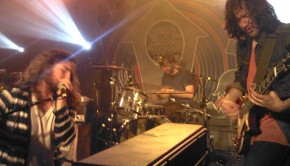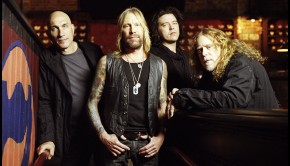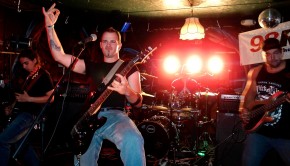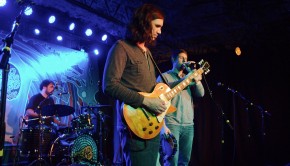More Colorful Rags: The Tarlatans (Sort of) Get Serious
When I first heard of the Tarlatans, I had an obvious question: what the hell is a tarlatan? The band relocated to Charleston from Clemson earlier this summer, and as is the case with so many young bands today, their sound oozes in and out of the nooks and crannies of the drafty old mansion we now call “Americana.”
Sitting down for a full-band interview, they’re only halfway into their seats when I pop the question. They all laugh, I imagine, because they get it a lot.
“When we first started playing together, we made music with a girl,” says singer/guitarist Ryan Williams. “She was an art student, so she knew about wood prints. And the tarlatan is the thing that’s used to clean it; this rag that you clean a wood print with. It’s dirty, but it’s beautiful because it has so many different ink stains on it.”
Williams plays acoustic and electric guitars and sings alongside Taylor McCleskey, the more traditional frontman of the band. As bassist/banjo player Eric Mixon pulled out his iPhone to search for a picture of a tarlatan to show me — they are, indeed, quite beautiful, in that unintentionally beautiful way —McCleskey pipes in, “It’s kind of a metaphor for people, you know, the older you get, the dirtier you get, but the wiser you are. You’re like a more colorful rag. And then one day, you’re just hanging out on a line in a studio somewhere.”
This past week, watching them perform live in the Last Band Standing competition finals at Wild Wing Café in Mt. Pleasant, I realized that McCleskey seemed remarkably the same belting his heart out onstage as he did sitting down with a beer. He had the same obvious good cheer, and he was prone to the same sort of spontaneous, quasi-philosophical comments (see last paragraph), but mostly he possessed the same kind of full-body energy, an almost manic positivity that drove their performance and pumped up the audience between songs.
When I ask about their self-titled debut album, McCleskey took me back to Clemson, circa last year. “[Williams and I] had a two-bedroom apartment, and we put bunk beds in one room and made a little studio in the other bedroom,” he recalls. “We recorded that album with two microphones and a ProTools setup that we dabbled with. Caleb Lavin, a good friend of ours and sort of our fifth member of the band, mixed it.”
Drummer Blake Shorter is still finishing up at Clemson, but he joins the Tarlatans for gigs here in town. Mixon, who is calmer than McCleskey but also prone to philosophical-isms — the frequency with which he uses the term “cosmos” is a running joke in the band — took a turn. “I’ve recorded for other bands in more professional places where you pay by the hour and you’re rushed,” he said. “And this was a much better process. For instance, on ‘Been Dreaming,’ at the end, we had a bunch of friends over that night, and we actually had them all sing like a chorus in the bathroom at the end of the song.”
“The bathroom was actually the booth,” Williams adds. Demeanor-wise, he is McCleskey’s opposite, acting as the “straight man” to McCleskey on stage and in person. I mention this because he spoke the previous line as if having a recording booth in the bathroom of a college apartment was as normal as having cereal for breakfast. “That’s where we would go to record our vocals,” he continues. “We literally sat on the toilet — I mean, the seat was down — but we would sit there with a microphone and track our vocal.”
As we all cracked up about this, McCleskey says, “We told ourselves the world would never know that but…” Williams interrupts, “But for us it was the norm.” McCleskey chuckled and said, “Like how sleeping six inches from each other’s faces in bunk beds for two years was the norm for us.”
Apparently, living together in such cramped quarters also led to finishing each other’s sentences.
Though they have fun goofing around with each other, the guys, who are all still in their early-to-mid-20s, take themselves very seriously as songwriters and performers. For instance, “Been Dreaming” (the song with the bathroom chorus) features dynamic singing from McCleskey and a driving drumbeat from Shorter that makes first-time listeners pick their heads up and look around at their friends as if to say, “Yeah, alright!” Once the beat starts picking up, it doesn’t stop; the song keeps building even after the last chorus. Williams and McCleskey harmonize beautifully, weaving in and out of each other as the music built to an unpredictable crescendo.
They have a high stage IQ and understand that audiences want songs to end on a high note, especially a high note that seems spontaneous, almost as if the band had lost themselves in the music. As they begin to tour more and more around the Southeast, this is perhaps their greatest asset.
While they’ve honed a strong stage presence through years of performing together at Clemson, they’ve also grew as songwriters, especially during the making of their debut album. Williams and McCleskey, who previously wrote separately, have begun collaborating with each other and with the rest of the band.
“One of the biggest things for us was a realization that me and Ryan came to,” McCleskey says. “There’s a point where you have to be brutally honest. And it’s scary because, you know, my mom’s going to listen to this record, or an ex-girlfriend will hear it. And we don’t write really depressing, emo stuff, but we do know how the realization of death affects how we live every day. I’ve had parents and girlfriends hearing a song and ask me if I’m depressed, like, ‘How is that in your head?’ It’s scary being that honest, but it’s real.”
As he gets deeper into his point, McCleskey’s voice gets louder, his hands throw themselves around spastically, and his face becomes more expressive. “We have a song, ‘Far Away,’ about a guy working on the docks,” he continues, only to have Mixon interrupt: “I don’t think I ever told you guys this, but I always picture my grandfather in that song. He worked on the docks here in Charleston.”
“Awesome!” yells McCleskey, as Williams’ confident grin widened at the thought. “Yeah, it’s about creating a vibe and transporting the listener,” continues McCleskey. “That song has a piano solo that sounds like a honky-tonk guy in the back of a saloon playing a sad piano, and every note emphasizes that vibe; that story of that guy on the docks.”
“I can’t speak for them, because they write the songs,” Mixon says. “But I feel like, with great songs, they just exist in the cosmos, and a great songwriter just taps into that. Every songwriter that I really admire, like Bob Dylan, has said that they’ll just start writing and they won’t even know what it’s about until later.”
Mixon also gives voice to the band’s forceful ambition, which seems to be more present in these guys than in a lot of young bands around today (most fans also seem to pick up on this, as they almost constantly refer to the band’s “potential”).“We want to be the best at what we do,” he says bluntly. “If you’re a banker, you want to be the best. We make music, and we’re going to go all out.”
“We want to make timeless music,” adds McCleskey. “And we feel like where the band is right now, where the music is, we’re going in that direction.”
The Tarlatans perform at the Drop in on Folly at 10 p.m. on Sat. Sept. 29, at the Barn Jam in at Awendaw Green at 6 p.m. (or so) on Wed. Oct. 3. They play at the Midtown Bar & Grill (559 King St.) on Fri. Oct. 5 at 9 p.m. Visit facebook.com/thetarlatans for more.
Comments
Powered by Facebook Comments







